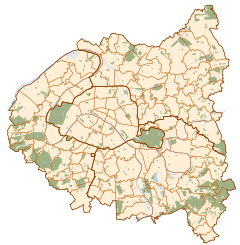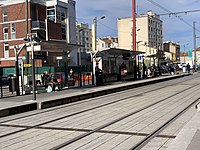Villejuif–Louis Aragon station
Villejuif–Louis Aragon | |||||||||||
|---|---|---|---|---|---|---|---|---|---|---|---|
 Platforms at Villejuif-Louis Aragon | |||||||||||
| General information | |||||||||||
| Location | 175 Boulevard Maxime Gorky Villejuif France | ||||||||||
| Coordinates | 48°47′14″N 2°22′03″E / 48.787175°N 2.367564°E | ||||||||||
| Operated by | RATP Group and ORA (RATP Dev, Alstom & ComfortDelGro) | ||||||||||
| Platforms |
| ||||||||||
| Tracks |
| ||||||||||
| Construction | |||||||||||
| Depth | Line 15: 42 m (138 ft) | ||||||||||
| Accessible | Yes[1] | ||||||||||
| Architect | Line 15: Philippe Gazeau | ||||||||||
| Other information | |||||||||||
| Station code | 26-09 | ||||||||||
| Fare zone | 3 | ||||||||||
| History | |||||||||||
| Opened | 28 February 1985 | ||||||||||
| Services | |||||||||||
| |||||||||||
| Other services | |||||||||||
| |||||||||||
| |||||||||||
Villejuif–Louis Aragon station (French pronunciation: [vilʒɥif lwi aʁaɡɔ̃]) is a station of the Paris Métro, located in the commune of Villejuif.
History
[edit]The station opened on 28 February 1985 when Line 7 was extended from Le Kremlin-Bicêtre and serves the commune of Villejuif as the southwestern terminus of one of Paris Métro Line 7's branches (the terminus on the other branch is Mairie d'Ivry).
The station is named after the Avenue Louis Aragon and Louis Aragon (1897–1982), a French writer.
Early plans to extend line 14 from Olympiades to the Orly Airport included the possibility of taking over the existing line 7 branch from Maison Blanche to this station. However, the inclusion of line 14 in the Grand Paris Express project means that the line 14 extension to Orly will only consist of new infrastructure and the plan has been shelved. Line 15 (another Grand Paris Express line) will serve this station from late 2026 onwards (as of August 2021),[2][3] two year later than originally intended in 2024,[4] with construction having started in 2017.
In 2020, the station was used by 4,029,467 passengers amidst the COVID-19 pandemic, making it the 28th busiest of the Métro network, out of 305 stations.[5]
Passenger services
[edit]Access
[edit]- Access 1: Avenue de Stalingrad - with an elevator leading to a connection with the T7 tram.
- Access 2: Boulevard Maxime Gorki - equipped with an elevator and a fixed staircase indicated by a mast with the yellow M logo.
- Access 3: Avenue Louis Aragon - with a fixed staircase.
- Access 4: Gare routière - with two fixed stairs, one of which is indicated by a mast with the yellow M logo.
Platforms
[edit]
Villejuif - Louis Aragon has a standard configuration with 2 tracks surrounded by 2 side platforms. Villejuif - Louis Aragon is a standard configuration station: it has two platforms separated by the metro tracks, surmounted by a mezzanine. The name of the station is written on enamelled plates. Lighting is provided by suspended luminous globes and neon lights on the mezzanine level. Small ceramic tiles of white and green colour placed vertically cover the walls and tunnel exits. The furniture is the Motte style, in orange.
Other connections
[edit]Since 16 November 2013, it has served as the northern terminus of tram line T7.
The station is served by lines 162, 172, 180, 185, 286, and 380 of the RATP bus network, by line v7 of the Valouette bus network and, at night, by lines N15 and N22 of the Noctilien bus network.
Gallery
[edit]-
Mezzanine level
-
Entrance at Avenue de Stalingrad
-
Entrance at Boulevard Maxime Gorki
-
Construction of line 15's station at Villejuif–Louis Aragon
-
T7 platforms
References
[edit]- ^ "Plan des lignes -personnes à mobilité réduite" [Line plan - persons with reduced mobility] (PDF) (Map). RATP (in French). May 2022.
- ^ "La Société du Grand Paris réactualise le calendrier du Grand Paris Express". Société du Grand Paris (in French). 2021-07-15. Retrieved 2022-01-21.
- ^ "Villejuif Louis-Aragon". Société du Grand Paris (in French). 2017-05-02. Retrieved 2022-01-21.
- ^ "Développement de la région capitale (Development of the capital region)" (in French). French government. 29 April 2009. Retrieved 25 September 2009.
- ^ "Trafic annuel entrant par station du réseau ferré 2020". data.ratp.fr (in French). Retrieved 2022-01-21.






